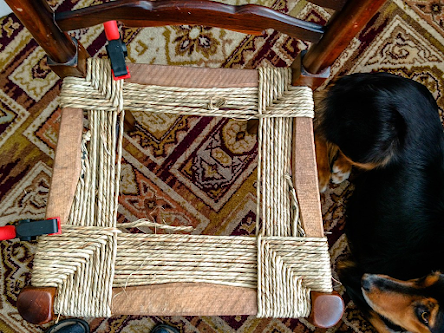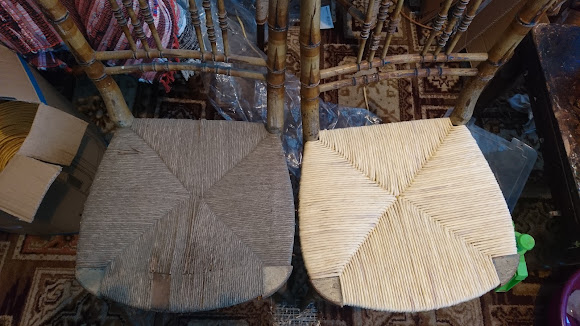the rush seat
Evidence of rush seating turns up throughout history. The Vikings almost certainly used this method, and in mediaeval Italy simple rush-seated ladderback chairs were commonly used. Strangely, considering that the best rushes grow in England, there's no direct evidence of rush-seating in Britain before the 17th century, though it's quite likely it was used before this.
The pattern is simple, and must have been discovered numerous times by different people throughout history. It's simply a matter of creating a twisted rope of some local material, and wrapping it in a particular way around a wooden frame. You simply attach it to the inside of the frame, and work your way round, over and under, over and under, until you reach the centre of the seat. This produces a strong, but comfortable seat.
Above: stool seated with ready-twisted natural rush.
In the UK, the common bulrush, Scirpus lacustris, grows in the River Thames and various Norfolk rivers, and this is the plant used most of all in this country for rush seating. In the USA the leaves of the cattail plant are more usually used, and each country will have its favourite seating material.
Anything that can be twisted into a rope can be used for this pattern. We often make seats in the rush pattern using seagrass, Danish cord, cotton cord and flax cord, and I've seen chairs made with brightly coloured nylon rope.
Above: a chair seat partly wrapped with rush cord. You can see the working end hanging loose in the middle. The next strand of rush will be tied to this, and the knot will be hidden inside as work progresses. We use plastic clamps to hold the rush in place as we work.
Above: two chairs from a set of four. The one on the left is still to be done, while the one on the right has been stripped down, cleaned and polished, and seated with paper rush.
You can find various materials suitable for the rush pattern on the e-commerce part of our website,
SitUpon Seats Shop.
If you'd like us to reseat your chair, just send us an email to
ally@situponseats.co.uk or give us a ring on 01900 813200.



